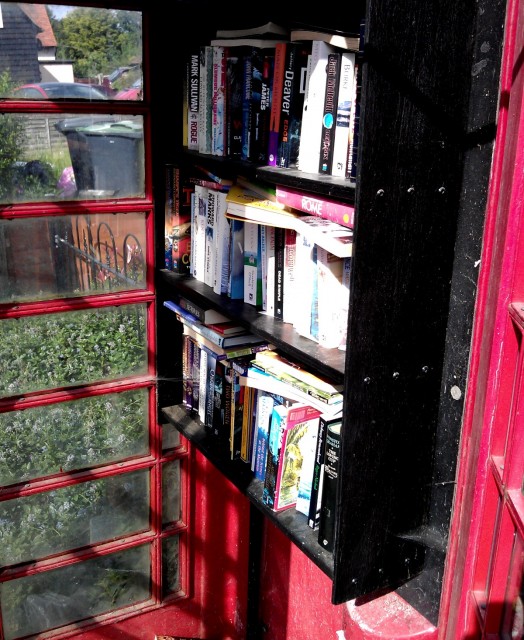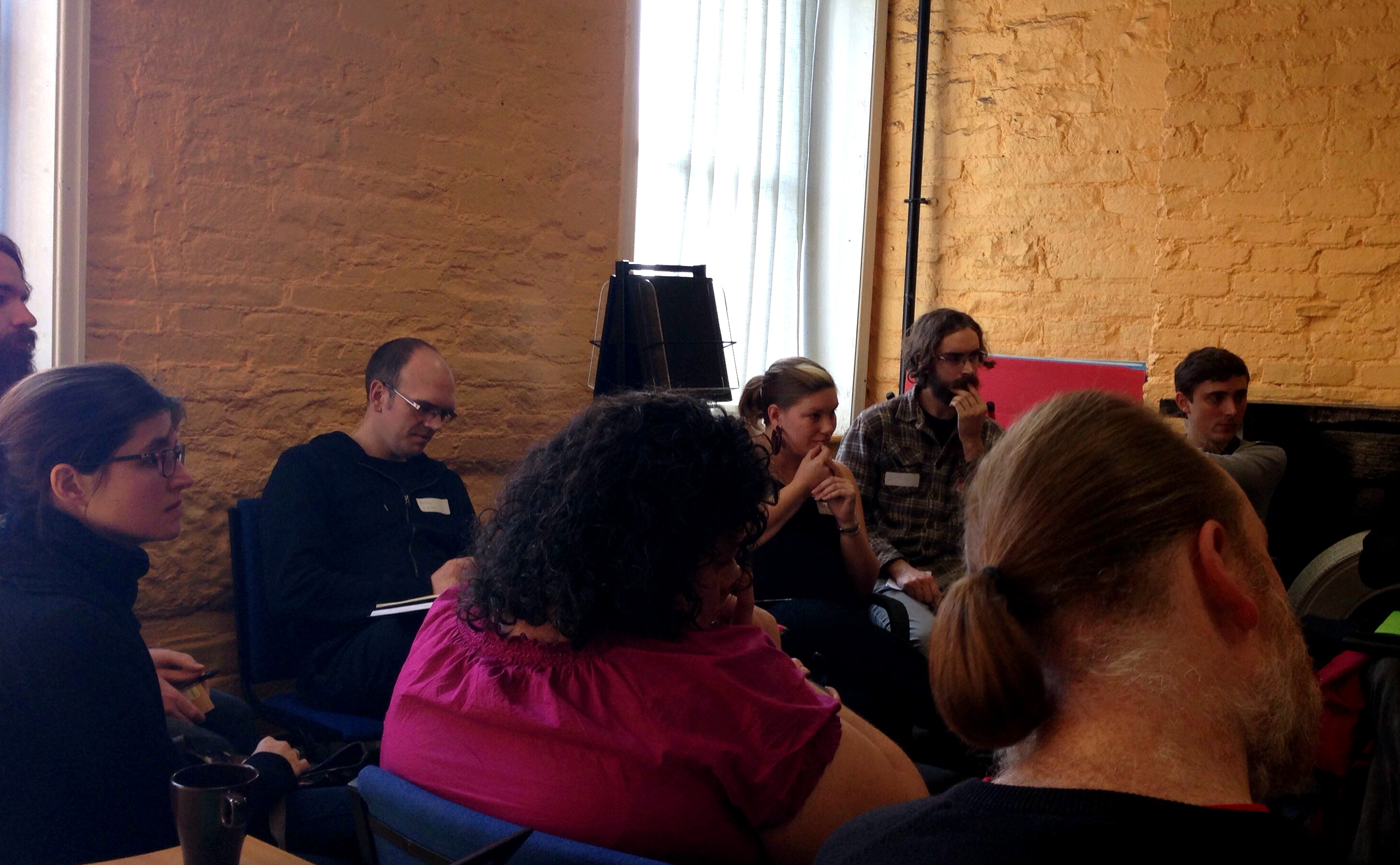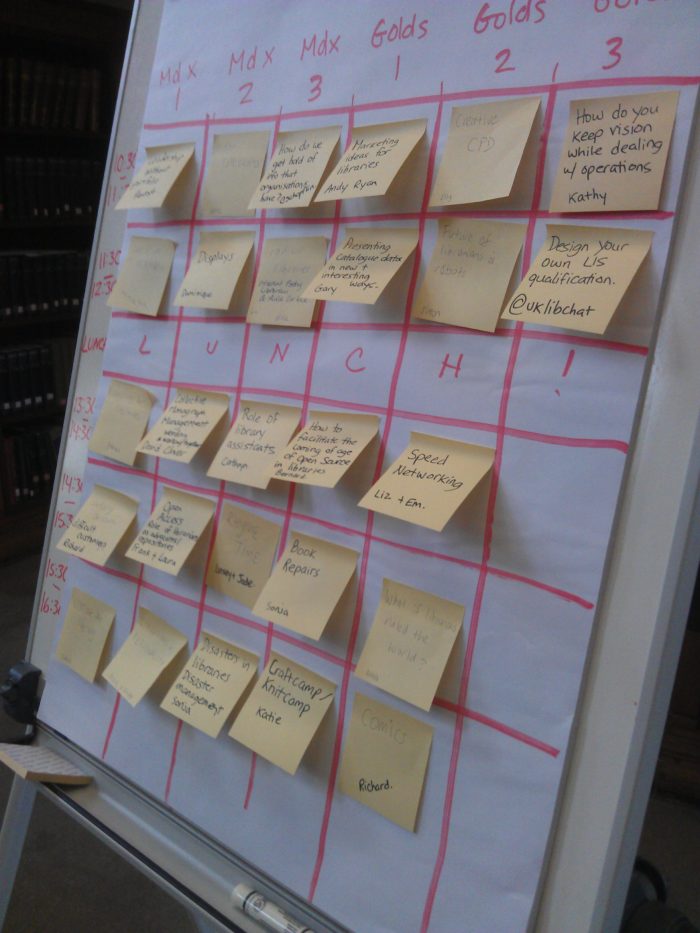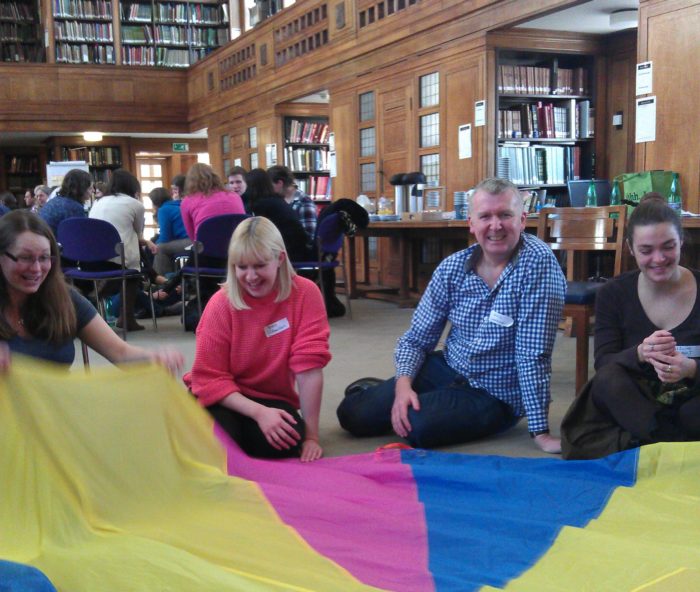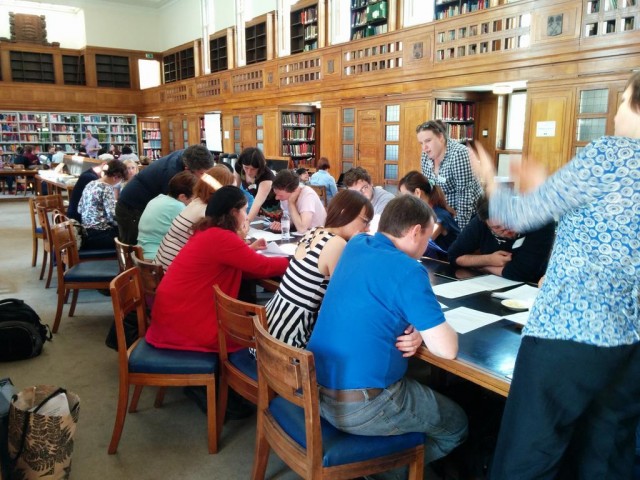
Introduction
Earlier in August I had the pleasure of helping organize and run a tech-focused library unconference, Pi and Mash, at Senate House Library at the University of London. The other organizers were Simon Barron of University of London, and Ka-Ming Pang of St Georges, University of London. They were both brilliant to work with and brought enormous energy, fresh perspectives, and thoughtfulness and professionalism to organizing the day. This event was a long time in gestation, from the initial agreement back in January that we’d work together to the day itself in early August. I had previously hosted Library Camp London at Senate House in March 2013, and following that event I’d thought about running something tech-focused as a Mashed Library event. Ultimately for me Pi and Mash was that event, though full credit is to Ka-Ming for suggesting we do it, kicking off the initial discussion on Twitter to gauge interest, and starting to organize us.
As an organizer it’s always encouraging to receive good feedback, and participants said some lovely things about Pi and Mash during and at the end of the day.
What I learned from organizing the event
The limits of ‘unconferencing’
Ahead of the event we wanted to provide a programme with appeal to different levels of technical ability, and especially beyond experienced systems workers. To do this we reached out to professional contacts for session ideas and pitches so we could launch with a timetable already partly populated. This timetabling in itself introduced a contradiction to the event that was never really resolved, and caused some issues: were we running a participant-driven unconference, or a regular conference with a top-down organization? I formed an impression from feedback that on seeing our speaker lineup, some participants felt intimidated about pitching due to not feeling technically knowledgeable enough. Additionally, we presented an ‘almost full’ timetable with space for unconference-style pitching. While this helped generate buzz and encouraged people to get a ticket so they could come to those sessions, it made it easier to view the day as a traditional conference that didn’t demand participants set the agenda. A related point is I’ve noticed unconference sessions, for example at Library Camp, becoming increased sophisticated over time and more pre-planned. Sessions are often no longer discussions, but make more use of technology such as online collaborative editing, use more formal methods in research and analysis, and attempt to engage people beyond the conference for example by tying in with planned chats on Twitter. For me this increased sophistication deepens engagement, but can work against the more exciting aspects of unconference spontaneity such as pitching an idea that is not fully-formed on the day. We did get pitches ahead of time on our discussion and ideas document, but these were the only ones pitched on the day so it felt a bit more like a call for papers than pitching.
What this means for practical technical sessions
As noted we wanted to ensure broad appeal to a range of different technical abilities. We especially wanted to demonstrate practical aspects of library systems work that would give a flavour of what it is systems librarians and other systems workers do. To this end it was wonderful that many delegates saw the day as an opportunity to stretch themselves with professional development, and expressed an interest in getting more involved with systems work in future. One of the facilitators observed to me on day there is a real difficulty in how to ‘bring people along with you’ if they are at different levels at the start. This makes running sessions that rely on pre-existing technical knowledge that much more difficult. One suggestion from feedback was to provide pre-work or reading ahead of the day for sessions that would benefit from it. I have mixed feelings about this as despite having run such sessions like that at conferences, I feel participants should also easily be able to choose what they will on the day, or even move between sessions. For me, this was most apparent for the Linked Data and OntoWiki session, although I know there were issues in other sessions too. This combined with technical dependencies for participants, who needed to install software on their own computers to get the best from the practical work. In hindsight, what we needed to provide were laptop computers with the relevant software pre-installed and ready to use, so we could simply hand a machine with a ‘known good’ configuration to everyone attending the session. This would have been challenging, but perhaps could have been feasible using loan laptops from Senate House Library stock and given enough time for preparation.
Safer spaces, and an apology
Ka-Ming provided the idea of very actively promoting and encouraging women facilitators and participants. Essentially, we did not want to run yet another tech event dominated by men but rather one that better reflected how our profession is populated. It was great to get positive feedback on this aspect, and suggestions from critical friends where we erred. One point I want to apologize for is our gender binarism in the initial ticket allocations to men and women. As organizers we discussed this after it was pointed out, and learned from it. In future I will do better, I will approach gender more carefully to help avoid reinforcing bias and discrimination. I am glad we implemented a safer spaces policy, repurposed with permission from OK Café, Manchester.
As professionals we might prefer to believe policies shouldn’t be necessary, but I argue they help create inclusive events in the first place. Even if a policy doesn’t need to be acted on, it provides a context to set expectations and helps attendees develop confidence they will be supported in resolving any problems. I now firmly believe safer spaces policies or codes of practice are necessary for conferences.
Being the organizer
The way in which participants interact, learn, and spark ideas off each other is something you try to positively influence as a conference organizer, but ultimately much of ‘the magic’ is out of your control. It helped that we provided a space that participants found friendly and inclusive, with longer session times than normal conferences. This allowed for discursive conversations and digging into the technical ‘long weeds’ as participants wished. This was an important aspect for my own development, as I identified I need to move beyond running events successfully (without say, some disaster befalling us), to thinking more deeply about the value gained by delegates for their own development and understanding ways in which we can support and facilitate this. Overall I would strongly recommend (un)conferencing organizing as a means of professional development.
Thoughts on practical aspects

Following Library Camp London I’d reflected on what made the day a success, practically, and we implemented much of this for Pi and Mash. This is summarized here: Practical suggestions for running your own Library Camp. Some things that remain true:
- Especially true for a technical event, your wireless absolutely needs to be working.
- Individual bottles are better than glasses for carrying water around the library.
- If you’re relying on someone for preparation such as moving furniture, survey the space ahead of time and prepare with the expectation your instructions will be followed to the letter.
- One thing that was again a problem was noise, as we were using large rooms with two sessions in them noise carried. This was a limit inherent in the spaces available to us, which were provided free of charge by Senate House Library. However we would definitely have been better to provide smaller separate rooms, or found a way to screen off larger spaces to dampen noise.
We organized Pi and Mash almost exclusively online, which saved a lot of travelling time even with all of us being London-based. We used:
- Google Hangouts to provide audio and video for meetings.
- Google Docs / Drive for collaborative editing and sharing of meeting notes and actions lists.
- WordPress.org for our website plus TablePress for tables. This was low cost as we could use existing web hosting and we all had practical experience with the software.
- Gmail for email. Specifically the trick was to push the ‘info@’ domain address to my own Gmail using POP3 and set it up to allow responding from that address. This made for quick and efficient replies to questions.
- Eventbrite for ticketing and emails to delegates. I still favour Eventbrite despite its quirks. Checkin is a breeze and mailouts are simple, and the quirks are at least quirks I’m very familiar with.
- Twitter – of course, the place for professional engagement in libraryland.
- Qualtrics for our post-conference survey (Imperial College London has a subscription).
We made some choices about what not to do with social media and other tools:
- We considered use of Lanyrd for session slides and materials, but it seemed a more useful tool for larger, more formal conferences where you would want to draw together lots of different media types, session recordings, and so on.
- Wiki. Ultimately we decided not to set up a wiki for Pi and Mash as we felt the limited amount of collaborative editing needed ahead of the event could be handed using a Google Doc. This is the model uklibchat use successfully, but from feedback some delegates reasonably expected a wiki to be available.
- Unfortunately it wasn’t possible to live-stream any presentations. There was demand for this ahead of the event, but it was too difficult to achieve technically and with limited staff resource. I have done this for events by using Google Hangouts on Air which can provides a slick, professional solution at low cost using consumer webcams and microphones.
In hindsight, in thinking about our approaches to communication I found Ned Potter’s description of communication channels as white noise, peripheral vision, or line of sight from a recent conference presentation very helpful.
The main area for improvement I would focus on for future events are reaching those who do not routinely professionally engage with social media:
- Mailing lists are still widely-used by library workers and I noticed rushes of interest when we mentioned Pi and Mash on mailing lists like lis-link.
- Targeted personal communication is very effective at helping publicize the event by word-of-mouth. For example: encouraging library and information science lecturers to promote the event to students; and to our colleagues to encourage team members to attend the event for professional development.

